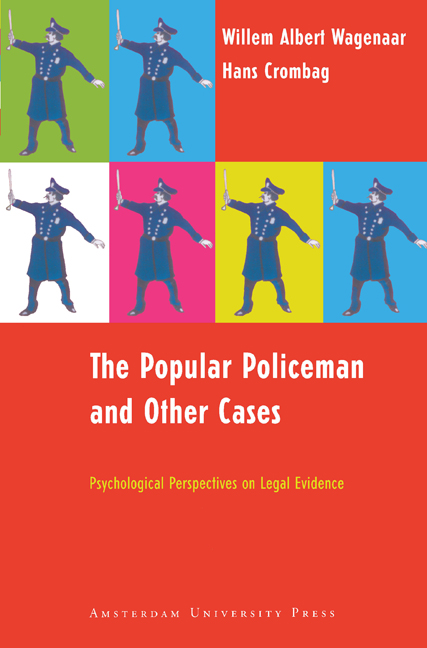Book contents
- Frontmatter
- Contents
- Foreword
- 1 Illegal Gambling or the Victory Travel Club
- 2 On Causal Reasoning or Death in the Warmoesstraat
- 3 Consumer Confusion or Potato Chips and Olive Oil
- 4 Fiction and Reality of ‘the Average Individual’ or the Case of Old Mr. Lane
- 5 Case Histories and Scientific Proof or the Case of JR
- 6 Not a Good Story or the Disappearance of Maddy and Vicky
- 7 Conflicting Scenarios or the Case of the Man who Needed a Companion
- 8 Two Processes Obstructing the Accuracy of Long-Term Memory or the Case of the Stolen Mercedes
- 9 Confessions after Repeated Interrogation or the Putten Murder Case
- 10 Collaborative Storytelling or the Artist’s Models and an Angry Neighbourhood
- 11 Allegation of Sexual Child Abuse in a Case of Disputed Visitation or Cindy's Story
- 12 Psychogenic Amnesia or the Case of the Amnesic Strangler
- 13 Obeying Reflexes or Death on the Climbing Wall
- 14 Visual Acuity or Shooting Mimi the Cat
- 15 Sexual Semiotics or the Case of the Popular Policeman
- Postscript: Psychological Expertise and the Law
- Bibliography
- Name Index
- Subject Index
5 - Case Histories and Scientific Proof or the Case of JR
Published online by Cambridge University Press: 16 February 2021
- Frontmatter
- Contents
- Foreword
- 1 Illegal Gambling or the Victory Travel Club
- 2 On Causal Reasoning or Death in the Warmoesstraat
- 3 Consumer Confusion or Potato Chips and Olive Oil
- 4 Fiction and Reality of ‘the Average Individual’ or the Case of Old Mr. Lane
- 5 Case Histories and Scientific Proof or the Case of JR
- 6 Not a Good Story or the Disappearance of Maddy and Vicky
- 7 Conflicting Scenarios or the Case of the Man who Needed a Companion
- 8 Two Processes Obstructing the Accuracy of Long-Term Memory or the Case of the Stolen Mercedes
- 9 Confessions after Repeated Interrogation or the Putten Murder Case
- 10 Collaborative Storytelling or the Artist’s Models and an Angry Neighbourhood
- 11 Allegation of Sexual Child Abuse in a Case of Disputed Visitation or Cindy's Story
- 12 Psychogenic Amnesia or the Case of the Amnesic Strangler
- 13 Obeying Reflexes or Death on the Climbing Wall
- 14 Visual Acuity or Shooting Mimi the Cat
- 15 Sexual Semiotics or the Case of the Popular Policeman
- Postscript: Psychological Expertise and the Law
- Bibliography
- Name Index
- Subject Index
Summary
Case histories are used to illustrate a scientific principle and often also to prove the validity of the principle. The history of psychology is particularly full of illustrious case histories; from Freud's Anna O. (cf. Freud, 1896) to Wilbur's Sybil (cf. Schreiber, 1973), Luria's Mnemonist (1987), Baddeley's Clive Wearing (1990), Woodruff 's Tichborne Claimant (1957), and Wagenaar's Ivan the Terrible (1988b). There are huge differences with respect to the use of such case histories in scientific discourse. Freud used cases to prove his theory. They constitute the empirical evidence in support of his theory, as he offers no other, more systematic and prospective empirical research. Therefore, showing a case as historically false as, for instance, Israels (1999) did for the case of Anna O. simultaneously undermines Freud's theory. Baddeley's description of Clive Wearing, a man who lost his memory after encephalitis, is of a different type. The case is not meant to prove that meningitis can have this effect; we knew this already. Also, the case is not meant to prove that amnesia really exists; that too was already known. The case is meant to illustrate the horrors of living as an amnesiac. The film presents a vivid image of the affliction and is remarkably effective in demonstrating a few simple facts that cannot be imagined easily. Baddeley's case history, moreover, provides a number of empirical tests, admittedly in n=1 designs, but open to the same scrutiny as any empirical study. Other investigators may repeat these tests provided that similar patients can be found, which is not unlikely, because memory loss is becoming more frequent in the aging population of Western countries.
In legal discourse, cases are used in an entirely different manner. Especially in common-law countries, the decision of a single case may become a precedent applicable to new cases. A precedent, however, is not based on the facts of the case, but on the reasoning followed in it. The Miranda rights (1966) from the case Miranda v. Arizona have become general rules. Their power does not come from the particulars of the Miranda case, but from the rationale underlying them. The rationale was based on legal logic, not on empirical fact.
- Type
- Chapter
- Information
- The Popular Policeman and Other CasesPsychological Perspectives on Legal Evidence, pp. 71 - 92Publisher: Amsterdam University PressPrint publication year: 2012



